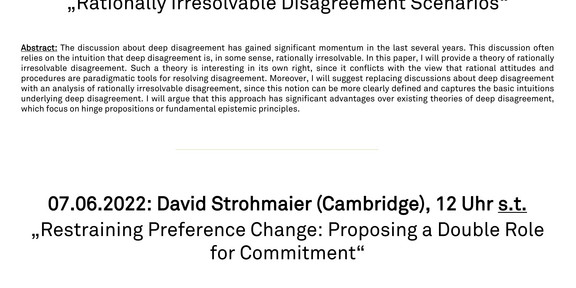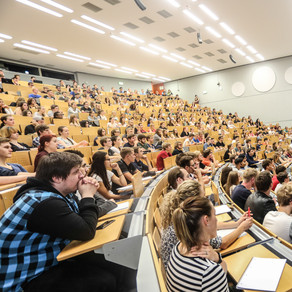Gastvorträge im Lesekreis Theoretische Philosophie

Gastvorträge im
Lesekreis Theoretische Philosophie
Sommersemester 2022
Raum 2.323, Emil-Figge-Straße 50
Alle Interessent*innen sind herzlich willkommen!
01.06.2022: Guido Melchior (Graz), 18 Uhr c.t.
„Rationally Irresolvable Disagreement Scenarios“
Abstract: The discussion about deep disagreement has gained significant
momentum in the last several years. This discussion often relies on the
intuition that deep disagreement is, in some sense, rationally
irresolvable. In this paper, I will provide a theory of rationally
irresolvable disagreement. Such a theory is interesting in its own
right, since it conflicts with the view that rational attitudes and
procedures are paradigmatic tools for resolving disagreement. Moreover,
I will suggest replacing discussions about deep disagreement with an
analysis of rationally irresolvable disagreement, since this notion can
be more clearly defined and captures the basic intuitions underlying
deep disagreement. I will argue that this approach has significant
advantages over existing theories of deep disagreement, which focus on
hinge propositions or fundamental epistemic principles.
07.06.2022: David Strohmaier (Cambridge), 12 Uhr s.t.
„Restraining Preference Change: Proposing a Double Role for Commitment“
Abstract: The presented text is part of an introduction to preference
change. While theories of preference change have attracted increasing
attention, they often neglect that some preferences are more robust than
others. One exception is the preference logic-based framework by Hansson
and Grüne-Yanoff, who are able to distinguish between more and less
robust preferences during a revision. Their framework, however, is
unable to address the question whether preference change occurs at all
or not. We propose that the robustness of preferences and the general
occurrence of a change event can be modelled together, and put forward a
commitment-based theory of preference change to do so. We argue that
commitments govern the dynamics of rational preferences when confronted
with experience. Furthermore, we claim a level of cognitive plausibility
that previous theories of preference change rarely attain.
Der Vortrag von David Strohmaier am 7.06. ist pre read. Den Text
erhalten Sie nach Anmeldung per Mail an paul.klurtu-dortmundde.




